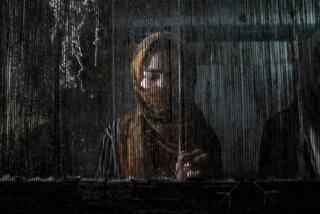Afghan Warlords Are Cited as Threat
- Share via
UNITED NATIONS — A senior U.N. official warned the Security Council on Thursday that the “fragile” security situation in much of Afghanistan is threatening efforts to rebuild the country and install a new government.
Though “more progress has occurred in Afghanistan in the past six months than anyone would or could have predicted a year ago,” powerful warlords continue to defy the country’s U.N.-backed interim regime, Undersecretary-General Kieran Prendergast told council members.
Many candidates for next month’s loya jirga, or national assembly, reportedly fear reprisal from entrenched local military and political leaders, he said, leaving open the possibility that some of the country’s approximately 380 electoral districts may not be represented at the gathering.
The assembly is charged with selecting a new transitional government, following a plan devised by U.N. officials and endorsed by the council last fall.
Ambitious foreign aid programs, considered essential to solidifying the new government’s hold on the country, cannot get underway “without real improvement in security outside Kabul and its environs,” Prendergast said.
Shortly after his address, the 15-member council voted unanimously to extend the mandate of the International Security Assistance Force for six months beginning June 21, with Turkey taking over command from Britain.
As expected, however, the council voted to still restrict the force’s operations to the area in and around Kabul, the capital, despite requests from U.N. officials and Afghan leaders that troops be deployed in outlying areas of the country.
U.S. generals leading the coalition campaign against Taliban and Al Qaeda holdouts have opposed expansion of the peacekeeping force, fearing that international troops might hamper combat operations in remote districts.
U.N. officials, meanwhile, say their efforts to build a stable new Afghan government are jeopardized by factional infighting, the rearmament of militias and open opposition to the interim regime from regional chieftains.
“In view of the absence of an expansion of the International Security Assistance Force beyond Kabul, the United Nations and the interim administration continue to believe that the international community should address these legitimate security issues as quickly as possible,” Prendergast said. “I am sure that the international community is fully aware that all its political and financial efforts in support of Afghanistan would be seriously compromised by a lack of tangible progress in the security environment.”
Some Express Fear
of a Return to Chaos
Despite the unanimous vote, several council members--Ireland, Syria and Mexico among them--echoed the security concerns voiced by Prendergast, who U.N. officials stressed was speaking for Secretary-General Kofi Annan.
Some U.S. legislators were critical of the council move.
“Unless we provide the necessary diplomatic, military and political support to extend ISAF’s mandate into other key cities and transit routes, we may well see Afghanistan fall back into the very sort of chaos and warlordism that spawned the Taliban in the first place,” said Sen. Joseph R. Biden Jr. (D-Del.), chairman of the Senate Foreign Relations Committee.
The Bush administration says Afghans should be equipped to provide for their own security needs.
In a meeting with donor nations in Geneva last week, Afghan authorities presented a plan for an 80,000-member national army that would initially cost $300 million a year.
More to Read
Sign up for Essential California
The most important California stories and recommendations in your inbox every morning.
You may occasionally receive promotional content from the Los Angeles Times.












